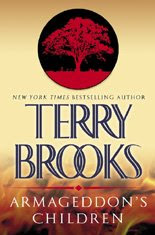Although comprehensive
world-building is something you should do
before you write an entire novel, I'm still going to participate in this activity post-
Ceilyn's Calling. The novel takes place entirely in a monastery, so thus far Ceilyn has not encountered the world at large. His "journey" is an internal one, both within his own psyche and within the structure of the building.
The world of Renaciman is a mixture of the sub-genres
high fantasy and
sword & sorcery, with requisite struggles of good versus evil, fantastical creatures, and doses of magic use. It's all very medieval in nature, with swords, crossbows, and magic potions. So what makes it unique in nature? How is Renaciman any different that any other high fantasy novel?
Ceilyn's Calling, unbeknownst to the reader (and perhaps never openly revealed), takes place in America in the year 3050. Instead of being a futuristic,
science fiction piece or a
dystopian literary rage against societal ills, this book explores a
post-apocalyptic world without any of the angst. In fact, all that the citizens of Renaciman know are their current lives, spent -- for the most part -- within the same village they were born in. History has been left in the dust of the ages; the religious institutions are embroiled in their own intrigues; and a god-king is attempting to usurp all power for himself.
In order to explore the world, we need to understand the nature of magic. This was actually the most difficult part of my novel, because, after all, how many people ponder the nature of
magic? It just
is, right? But how can magic come into being somewhere down the road in a future America? Well, in most cultures there is an tacit agreement that magic is or consists of
energy. We know that energy exists on a sub-atomic level. Therefore, in my definition, magic is simply the ability to shift, control, or manipulate energy on the sub-atomic level. And that cleared a lot up for me.
Once I penned a
post-nuclear Planet Earth where survivors developed the ability to control different forms of energy, I understood how I could interject a scientific form of magic (
scientific used loosely).
Over time, some survivors focused their new-found abilities to rid themselves and others of radiation sickness,
keloids, and tumors. They became known as 'healers' within the society. Others, who were either simply curious or desirous of exploiting new-found powers, experimented, studied, and learned many skills outside the scope of healing, becoming known as 'mages.' Notice the reliance on known concepts or words within the English language.
None of this exists within the novel
Ceilyn's Calling. Instead, the only remnant of past civilizations are the village stones that hold the last waning vestiges of
radioactivity, now vital for any magic user. Some stones have disintegrated; others have been lost; still more are being plundered by the king's soldiers who have been instructed to haul every stone they find to the palace. The only other place that has its magic intact is the monastery, where Ceilyn has grown up using spells and chants. He does not know that the world around him is gradually losing its access to power.
The second novel,
Ceilyn's Curse, details his journey from monastery to palace -- one place of powerful magic to another -- and the emptiness between. He must learn to rely upon himself and the skills of his friends if he hopes to survive without magic along this circuitous and dangerous route. Once he arrives at the palace, of course, he uses this new-found confidence and self-reliance to outwit the most powerful mage and enemy of the people, Lord Xavier. What else could he do?















